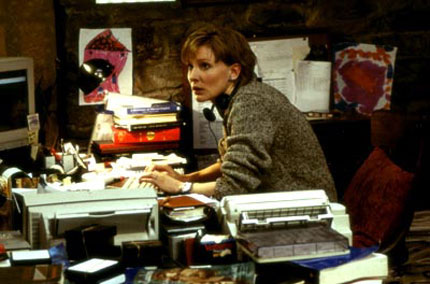

|
Veronica Guerin
6 out of 10 |
 |
|
The Darker Side Of Gilligan's Ireland "Everyone in Ireland remembers where they were when they heard Veronica Guerin was killed", says the narrator at the end of the film. The veracity of this is something to which I cannot testify as I originate from England, where violence over the Irish Sea is a taboo subject. In polite conversation, most people would find bestiality, brain cancer and bowel disorders more acceptable subjects to discuss. Nonetheless, the rising level of deaths and persecution of journalists should be of deep concern with a worldwide movement to oppress the truth that seems second only to the era of the fascist-riddled 1930's. 15,000 people a day in Ireland were injecting heroin by 1994 as the Republic was drowning in an ocean of drug-driven crime, or rather aggressive purple flying elephants as most of its youth must have seen it. Witnessing the sheer depravity on the working class streets of Dublin, "Sunday Independent" reporter Veronica Guerin begins to delve into the crisis. Applying pressure to "The Coach" Traynor, (Ciarán Hinds), an underworld contact who she has seriously squirming, Guerin begins to try to expose those behind the trade, and quickly raises the ire of drug baron Gilligan, a thinly disguised representation of Irish mobster Cahill, (Gerard McSorley). Despite being threatened, beaten up and shot at, she persists until her demise on June 26th 1996. True courage is not being afraid, but actually being terrified, yet still proceeding with what you know to be right. In this, Cate Blanchett produces one of her greatest ever performances as the tragically doomed Guerin, who is not only a brash journalist who could march straight into a brothel to confront Traynor in bed with two hookers, but she is also a wife, a mother and a woman who collects speeding tickets likeothers collect their mail. As her husband Jimmy (Paul Ronan) points out how easy it would be for the gangsters to find her when they are the only "Guerin" in the Dublin phone book. Although more commonly known for big, expansive fields of destruction, producer Jerry Bruckheimer has stated that he has a passion for "a picture about people who make a difference" and Joel Schumaker was clearly a great choice as director for his penchant for the gritty reality of streetlife - gangsters, hookers and hard drugs - just as we saw in his previous flick, "Phone Booth" (Indeed, one knows it's a Schumaker film as it even has Colin Farrell, in this instance, in a cameo role as a soccer fan). With a film by Bruckheimer and Schumaker, about a real life woman journalist who was killed by the mob for trying to bring to justice those who had so destroyed the youth of her country, this national hero and symbol of fearless journalism should have almost guaranteed a string of Academy Awards. When two gay cowboys can bedazzle the Oscars as a piece of liberal art, how is it then that "Veronica Guerin" barely scraped a "Solidarity Award" (a sort of booby-prize for trying) at the San Sebastián International Film Festival in Spain? What went wrong? It certainly can't be the paltry budget of $17million as it was filmed on location in Ireland, a country whose economy has regularly won the wooden spoon for having had the highest national debt per capita, it is so bombed out that one can buy a 16-bedroom mansion for little more than a month's rental on a parking space in downtown Manhattan. Much of the problem lies with the way Irish American screenwriters Carol Doyle and Mary Agnes Donoghue tell Guerin's story. Having her assassination in the first few minutes and putting the rest of the tale into flashback might well have been essential to gain the attention of Hollywood's agents and studio chiefs, but it gives away the ending for those who had never heard of her, probably constituting about 95% of its audience. Furthermore, before her death, the real Veronica Guerin had been contacted by Michael Sheridan to write her story and she had instructed that it not to be one of liberal martydom. After dying in a hail of bullets, it could hardly be anything else and since those responsible were such clumsy, low IQ criminals, everyone in the picture is a stereotype who does the obvious. Worse, by telling events behind the scenes as they happened, there is no suspense. When she is on the wrong track in blaming the Protestant UVF of Ulster for a contract killing, we all know she's been fooled half an hour before she does. As a result, "Veronica Guerin" is as bland as the baking powder she used for her muffins and they use to make crack. Despite being known,
the ending is still a masterful piece of tragedy that truly brings tears
to one's eyes. Sadly it was generally lost on a North American public
so anaethetised by the sort of aimless and ubiquitous Hollywood fictional
violence, so usually associated with Bruckheimer's other work. To them
it was "someone else's problem" and the increasing death rate
of journalists in the real world is nothing more than a footnote at
the bottom of CNN's web page. Interestingly enough, Ancient Rome also
began punishing messengers for the bad news they
brought ...shortly afterwards the Empire fell.
Film Critic: Robert L Thompsett
|
|